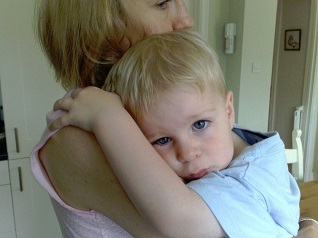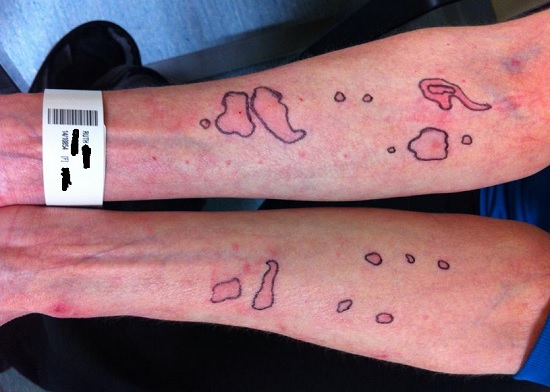Just for a change as I’m sure you get bored with my voice on here all the time, here is a blog about Eosinophilic gastrointestinal disorder (EGID) which I have to confess to knowing very little about.
Here to entertain you today is Kate who writes The Recipe Resource blog and also attended the Houses of Parliament Allergy briefing which I spoke at earlier this month.
She shares my passion that more awareness is needed amongst the NHS about both IgE and non IgE mediated allergic responses; something which sadly is still very poorly understood amongst the medical profession.
She started her blog to support those catering for multiple food allergies, particularly in children. Her youngest children suffer from EGID (Eosinophilic Gastrointestinal Disease) which amongst other things manifests as reflux and constipation caused by food allergies. Providing a broad spread of alternatives not full of sugars, fillers or preservatives can be quite a challenge! It’s easy to find baby foods with few ingredients, and supermarkets stock a variety of adult “free from” foods, but children are sadly often neglected. You can find out more using the link below… and now, over to Kate.
So what is Eosinophilic gastrointestinal disease?
Eosinophilic disorders occur when eosinophils, a type of white blood cell, are found in above normal amounts in various parts of the body. When the body wants to attack a substance, such as an allergy-triggering food or airborne allergen, eosinophils respond by moving into the area and releasing a variety of toxins.
This is a Type 4 Hypersensitivity, or delayed hypersensitivity. Many people with EGID will not test positive in skin prick tests or RAST allergy tests because it is a localised, delayed response. It is still an immune response however and a true allergy! – See more at: http://thereciperesource.blogspot.co.uk/p/what-is-egid.html
Getting a diagnosis
We encountered the world of EGID via Gastroesophageal reflux disease (GORD) symptoms initially. My whole family on my Dad’s side had always suffered Gastro Oesophogeal Reflux to some extent (myself included) along with plenty of IgE allergies, autoimmune problems and supposed Irritable Bowel Syndrome (IBS). I became very involved in supporting other parents dealing with infant reflux, and became aware that whilst other people’s children seemed to outgrow their symptoms, ours waxed and waned, changed over time but certainly never went away.
In 2010 our 4 year old twins, who suffer most of all my children (I have 4, yes I’m a glutton for punishment!) were referred to Great Ormond Street Hospital (GOSH) and received diagnoses of EGID. It is highly likely that many family members suffer this inflammatory disease to some extent.
The average age for diagnosis of EGID is currently aged 5, which means that just like us, most families struggle to make sense of and cope with a whole spectrum of symptoms without recognition and understanding, feeling isolated and all too often facing speculation that they are fabricating so many symptoms because there is no easy answer.
For us we had severe reflux, Sandifer’s Syndrome, motility problems, reactions to food, swallowing difficulties and dangerous choking episodes, eczema, breathing problems and blue episodes, some IgE responses, developmental delays, Faltering Growth (FTT), night sweats, mouth ulcers, rashes, joint pains, hypermobility, mood swings/behaviour problems and poor temperature regulation, unhappy, screaming babies who never slept and a never ending round of feeding and clearing up. I was even told by one paediatrician, (in the middle of all this and after less than 30 minutes sleep) when the twins were around 9 months old that “Reflux in children who are not physically disabled always ends before their first birthday”. I wish!
But whilst a diagnosis was vindication of my sanity (at least in respect of the children’s medical issues!) it didn’t offer easy answers.

Suffering from what is still an emergent disease means frequently changing attitudes to symptoms and treatment (particularly between doctors and hospitals) is at best confusing and at worst pretty terrifying. As with IgE responses, symptoms can occur with the slightest exposure – if my daughter has the tiniest amount of gluten or soya she is unwell for weeks, with crippling abdominal pain, reflux with regurgitation and sometimes vomiting, constipation and abdominal distention so bad she looks pregnant. The responsibility of feeding a child who is so sensitive is huge, and she reacts to all dairy products, soya, wheat, gluten, some sugars and cannot safely swallow most meat due to swallowing difficulties resulting from years of reflux. And the sad reality with EGID is that whilst removal of the offending protein does improve symptoms, prolonged avoidance tends to make the next response more severe.
Her twin brother has bigger problems with motility, but having had fundoplication surgery years ago his reflux is much better than it was. But he spends considerable lengths of time on the toilet each day, often repeatedly in the night and suffers regular bouts of pain. He has also fallen prey to the “Allergic March” and developed Hay Fever, rhinitis and asthma as he has got older. As with other allergies gut allergies seem to run in families. Both my older children suffer a variety of allergies and gut symptoms as do I.
How do you treat EGID?
Treatment and advice is not universal – it varies between consultants and is frequently changing. Allergy medications, drugs that reduce histamine production in the gut and mast cell stabilisers like Nalcrom (sodium cromoglycate) are a first line of defence in treating EGID. Exclusion diets usually go hand in hand and for the most severely affected elemental feed is used as a substitute for food. This can be given temporarily or long term in severe cases. A tiny minority require parenteral feeding, via an access line directly into the heart which just goes to show the massive impact gut allergies have on a rare few.
Although EGID is an “emergent disease”, gut allergies are not new. NICE guidelines issued Feb 2011 set out advice for diagnosis and assessment of food allergy in children and young people, so you would be forgiven for thinking that over two and a half years later most healthcare professionals would have had sight of this document, given the alarming escalation of food allergy in the UK population as a whole, and more specifically in children. And yet far FAR too few doctors, nurses, Health Visitors and even Consultants are unfamiliar with delayed allergic reactions (particularly those in the gut) beyond Coeliac disease and Crohn’s. There is still frequent misunderstanding over where intolerances end and allergies begin and how a non-IgE allergy is even possible, let alone how it can impact on the human body.
How does this affect the Eosinophilic child?
My children feel “different” far too much of the time. They cannot eat school meals in a school whose policy is for the vast majority to subscribe.
They cannot eat food at parties and take a lunch box, they cannot eat out except on rare occasions, they take medication several times daily, have frequent hospital appointments and regular physiotherapy.
Holidays are infrequent and challenging, days out much the same.
Following a long, tearful discussion with my daughter during her school’s “Healthy Eating” Week about how chips really are important for her diet and are not intrinsically “bad” I wrote an explanation for other children for her to take in to school. Poor self esteem is as important for delayed allergies and IgE allergies. This year my daughter became so distressed she started pulling her hair and eyebrows out…
But aside from all this the bigger question is still being neglected – WHY are SO many children suffering severe gut allergies? Why does our youngest generation suffer food protein allergies on epidemic proportions? Because seriously, that’s what we are looking at here.
At the twins’ school, six children have a diagnosis of EGID now. SIX. And of those I have helped support on forums over the years, friends I have made, I know about 50 children with gut allergies impacting seriously on their lives. Our Consultant at GOSH asked my daughter and I to appear on TV for the 100th Anniversary of GOSH to spotlight the Gastro department and highlight the escalating number of children suffering from gut allergies. He used the word epidemic then, and it was no exaggeration.
But it seems no one is doing the Maths, taking the data and analysing it. No one is sending out the information and any new results to local hospitals, explaining how gut allergies work, sharing new knowledge. Our NHS is functioning in crisis mode and only dealing with the here and no, the in-my-face-and-un-ignorable crisis/case I have to address. But at some point, SOMEONE or some group is going to HAVE to address this massive issue and start looking at why our children cannot eat. At why their digestive systems are no longer happy in the twenty first century first-world environment we are bringing them up in. I would like to hope that in the not so very distant future non IgE allergies have the recognition and care IgE allergies currently have, although a more holistic approach to both would be better!
Thank you Kate for sharing a heartfelt life story of EGID in just one small family. Has anyone else reading this got experiences or a diagnosis of EGID? How do you cope? How long did it take you to get a diagnosis? How can we make things better for the future generations?














Great article.
I also have a child with EGID, she is 5 now, diagnosed just before two. Her symptoms are failure to grow, headaches, nausea( every day) vomiting, diarrhhea.she also has associated hyper mobility, raynaulds, asthma and allergies.
She is also tube fed through gastrostomy.
Hi Flojan, thanks for commenting. If you don’t already know Kate who wrote this blog post I hope the two of you can link up to support each other. This sounds really hard for both you and your little girl. She shouldn’t be having all this to cope with as well as growing up. I’m glad you have found a fairly quick diagnosis though and hopefully thinks will improve for your daughter. I only have a few of these things to contend with as an adult so I know how touch it is when you regularly feel ill, how tiring, exhausting and depressing it can be when you can’t even take getting out of bed well each morning for granted. Thanks for reading and commenting.
Hi Flojan, sorry your little girl suffers so much too Raynaud’s is interesting because we all have that too, and EGID is currently considered a possible autoimmune disease (I also have authimmune thyroid disease) and certainly autonomic symptoms like temperature regulation are part and parcel of EGID. Thanks for reading
Raynaud’s is interesting because we all have that too, and EGID is currently considered a possible autoimmune disease (I also have authimmune thyroid disease) and certainly autonomic symptoms like temperature regulation are part and parcel of EGID. Thanks for reading 
Great Post Kate
Thanks Lorraine! Hope you’re well.
Thank you so much for getting the message out about EGIDs. My son was diagnosed with EGID at the start of this year following 7 years of health problems and battles with the NHS to get that diagnosis. I regularly read Kate’s blog, thanks to mutual friends at FABED (Families Affected by Eosinophilic Disorders) and am another keen blogger trying to get information about EGID out there.
Our biggest problem is that our son’s symptoms aren’t (for the most part) obvious and he runs around like any other healthy child – it’s just we know that he lives with constant pain, multiple food allergies and has a chronic illness that nobody knows a great deal about. It’s a hard battle to fight, but one that we’re determined to conquer.
Rx
Thanks Rachel, this is all down to Kate, who I met only recently. I hadn’t really know much about EGID but it does sound like a roller coaster of learning to get to the bottom of it all. So complex, and like all these conditions, no two people have exactly the same symptoms making diagnosis so hard. And you’re right, when we all look OK to the outside world and can do normal stuff, the daily grind of coping with the pain, the flare-ups and new reactions is kind of all going on underneath, in the background. Noone sees that. If you’re like me, you will hide that side of his life from the outside world. I become a recluse, only emerging when I’m suitably back under control. It’s hard, but like a duck paddling away underneath but gliding smoothly over the water. Keep it up though. It’s a hard battle but it gets easier. Bit by Bit.
Great overview and story Kate and Ruth, thank you. Just to let you know I have added a link to it on a blog post I wrote about Eosinophilic Disorders a while back here http://trulyglutenfree.co.uk/2012/11/19/have-we-got-an-eosinophilic-disorder/
and have added EDs/EGID to my new section on Allergy Conditions here http://www.purehealthclinic.co.uk/health-a-z/allergy-and-food-intolerance/allergy-conditions/ which I am gradually building up with the more unusual sensitivity conditions so that people can recognise them more easily maybe and get help earlier.
Thanks Micki – Thanks so much for sharing. Your website really is a great resource
My son also has EGID and I was lucky to have an amazing consultant who see it right away, but it took me till he was almost two to get to see him on the Nhs. No one ever knows what I’m talking about when I say that he has EGID, gp’s included so it’s nice to see someone out there trying to help make it known and understood. X
It is complex and I’m so glad to hear you found an amazing consultant. I hope you’re still managing well and coping with things. Thanks so much for your comment.